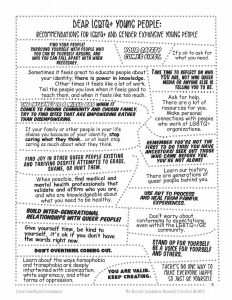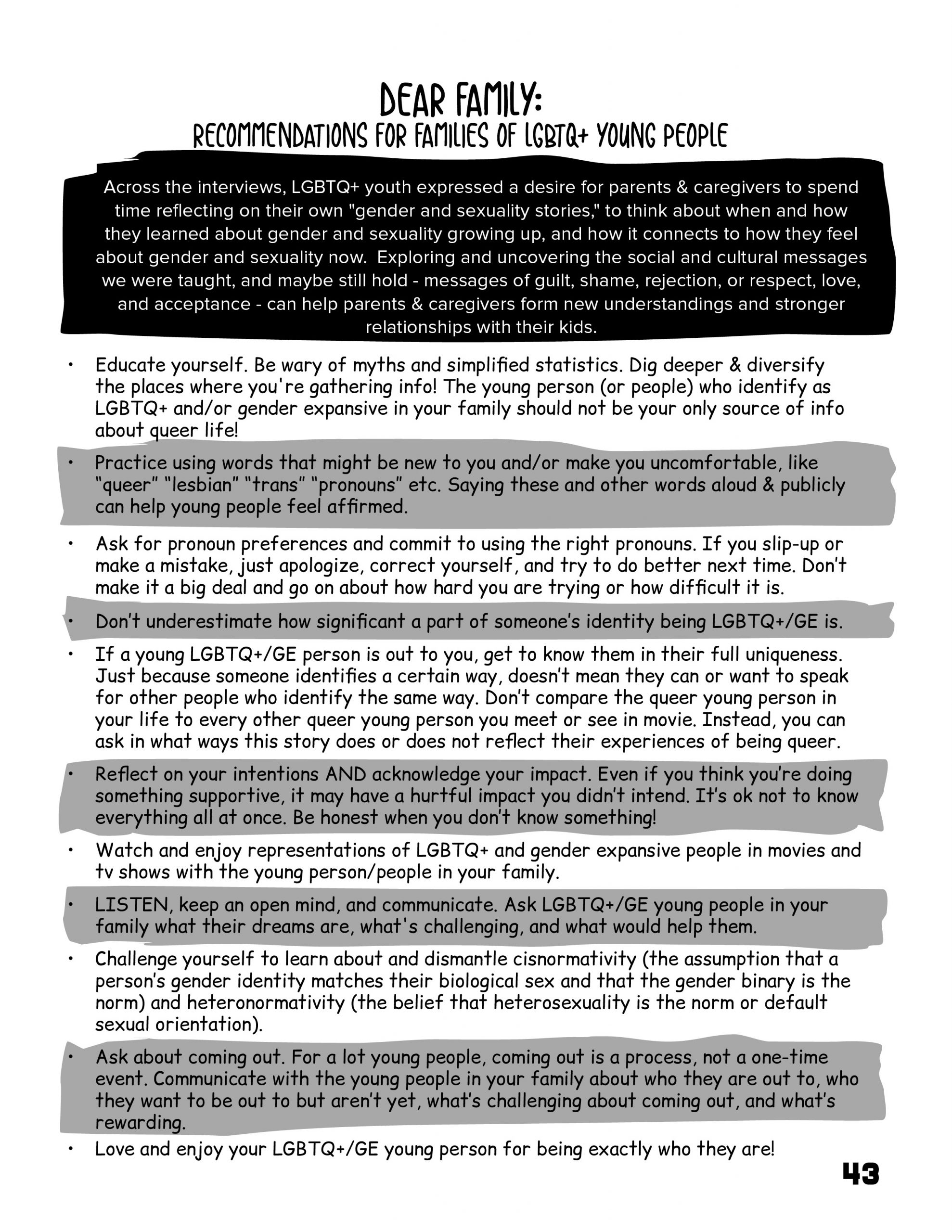As a part of our group interviews we collaboratively developed recommendations for LGBTQ+ youth and families…
Dear LGBTQ+ Young People…
| Find your people! Surround yourself with People who you can be yourself around, and who you can fall apart with when necessary. |
| Your safety comes first. |
| It’s OK to ask for what you need. |
| Sometimes it feels great to educate people about your identity; there is power in knowledge. Other times it feels like a lot of work. Tell the people you love when it feels good to teach them, and when it feels like too much. |
| Take time to reflect on who YOU are, not who queer media or anyone else is telling you to be. |
| The internet is a mixed bag when it comes to finding community and chosen family. Try to find sites that are empowering rater than disempowering. |
| Ask for help. There are a lot of resources for you. Make personal connections with people who work at LGBTQ+ organizations. |
| If your family or other people in your life shame you because of your identity, stop caring what they think… or at least stop caring as much about what they think. |
| Remember you’re not the first to do this! You have ancestors! Seek out those who came before you. You’re not alone! |
| Find joy in other queer people existing and thriving despite attempts to erase, shame, or hurt them. |
| Learn our history. There are generations of queer people behind you. |
| When possible, find medical and mental health professionals that validate and affirm who you are, and who are knowledgeable about what you need to be healthy. |
| Use art to process and heal from painful experiences. |
| Build inter-generational relationships with queer people! |
| Don’t worry about conforming to expectations, even within the LGBTQ+/GE community. |
| Give yourself time, be kind to yourself, it’s OK if you don’t have the words right now. |
| Stand up for yourself. Be a voice for yourself and others. |
| Don’t overthink coming out. |
| Learn about the ways homophobia and transphobia are deeply intertwined with colonization, white supremacy, and other forms of oppression. |
| There’s no one way to make everyone happy, so just be yourself. |
| You are valid. Keep creating. |
Dear Families…
| Across the interviews, LGBTQ+ youth expressed a desire for parents & caregivers to spend time reflecting on their own “gender and sexuality stories,” to think about when and how they learned about gender and sexuality growing up, and how it connects to how they feel about gender and sexuality now. Exploring and uncovering the social and cultural messages we were taught, and maybe still hold – messages of guilt, shame, rejection, or respect, love, and acceptance – can help parents & caregivers form new understandings and stronger relationships with their kids. |
| Educate yourself. Be wary of myths and simplified statistics. Dig deeper & diversify the places where you’re gathering info! The young person (or people) who identify as LGBTQ+ and/or gender expansive in your family should not be your only source of info about queer life! |
| Practice using words that might be new to you and/or make you uncomfortable, like “queer” “lesbian” “trans” “pronouns” etc. Saying these and other words aloud & publicly can help young people feel affirmed. |
| Ask for pronoun preferences and commit to using the right pronouns. If you slip-up or make a mistake, just apologize, correct yourself, and try to do better next time. Don’t make it a big deal and go on about how hard you are trying or how difficult it is. |
| Don’t underestimate how significant a part of someone’s identity being LGBTQ+/GE is. |
| If a young LGBTQ+/GE person is out to you, get to know them in their full uniqueness. Just because someone identifies a certain way, doesn’t mean they can or want to speak for other people who identify the same way. Don’t compare the queer young person in your life to every other queer young person you meet or see in movie. Instead, you can ask in what ways this story does or does not reflect their experiences of being queer. |
| Reflect on your intentions AND acknowledge your impact. Even if you think you’re doing something supportive, it may have a hurtful impact you didn’t intend. It’s OK not to know everything all at once. Be honest when you don’t know something! |
| Watch and enjoy representations of LGBTQ+ and gender expansive people in movies and TV shows with the young person/people in your family. |
| LISTEN, keep an open mind, and communicate. Ask LGBTQ+/GE young people in your family what their dreams are, what’s challenging, and what would help them. |
| Challenge yourself to learn about and dismantle cisnormativity (the assumption that a person’s gender identity matches their biological sex and that the gender binary is the norm) and heteronormativity (the belief that heterosexuality is the norm or default sexual orientation). |
| Ask about coming out. For a lot of young people, coming out is a process, not a one-time event. Communicate with the young people in your family about who they are out to, who they want to be out to but aren’t yet, what’s challenging about coming out, and what’s rewarding. |
| Love and enjoy your LGBTQ+/GE young person for being exactly who they are!
… We leave you with a letter in a collective voice from the data we collected. We address this letter families of LGBTQ+ youth, but it is useful for all caregivers and advocates lucky enough to have LGBTQ+ and gender expansive youth in their lives, including lawyers, doctors, social workers, and educators. Dear families, We want you to begin with yourself. It’s OK to not know everything all at once — we don’t either. We are all still learning about ourselves, and so can you begin to reflect on your own experiences with gender and sexuality no matter where you are in life. This way, you can learn about cisnormativity (the assumption that a person’s gender identity matches their biological sex and that the gender binary is the norm) and heteronormativity (the belief that heterosexuality is the norm or default sexual orientation) in a way that makes the most sense to you. As you learn on your own, be wary of myths, essentialist ideas, and simplified statistics. Queer young people in your life should not be your only source of information about the LGBTQ+ experience! Make sure to dig deeper on your own and diversify your sources so that the young person/people around you who identify as LGBTQ+ and/or gender expansive don’t have to bear the burden of explanation. The queer community contains multitudes, and no one person can represent it all. As you learn more, you can practice using words and phrases that might be new to you and/or make you uncomfortable to say out loud. For example, make asking for pronoun preferences a regular part of meeting new people or organizing group spaces. If you slip-up or make a mistake (it happens!), simply apologize, correct yourself, and do better next time. The worst thing you can do is turn it into a big deal and go on about how hard you’re trying and how difficult it is. It can make the person you hurt feel like they need to comfort you instead. Your intentions may be good, but you still need to acknowledge the impact of your words and actions when they cause harm. Be with the LGBTQ+/GE youth in your life. Get to know them in their full uniqueness. Ask them what challenges they face, and how you can help. Ask them what their dreams are. Last but not least (and certainly not all), love your LGBTQ+/GE young person for being exactly who they are! We wish you all the best on this wonderful journey, The Beyond Acceptance Research Collective (BARC), of the Public Science Project |
|
Wanna Share? Print a “Dear LGBTQ+ Young People” or “Dear Families…” handout:
|

